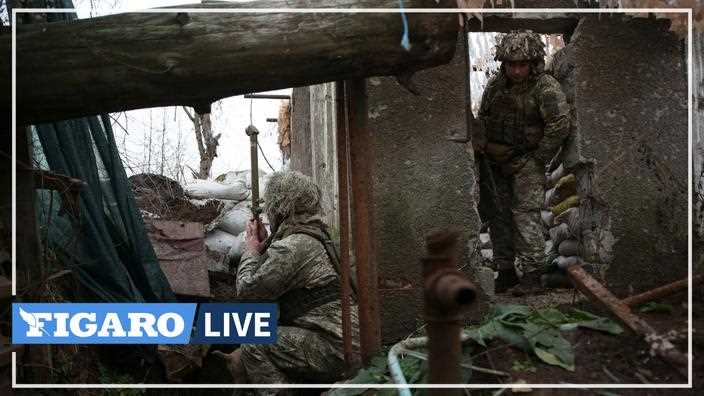The three Baltic states said in a statement they would send US Javelin and Stinger missiles after being cleared to do so by Washington earlier this week.
Estonia, Latvia and Lithuania announced on Friday that they would send anti-tank and anti-aircraft missiles to Ukraine to enable it to defend itself “in case of Russian aggression”. The three Baltic states, formerly under Soviet rule, said in a statement they would send US Javelin and Stinger missiles after being cleared to do so by Washington earlier this week. “In light of Russia’s increasing military pressure in Ukraine and the region, the Baltic states have decided to meet Ukraine’s needs and provide additional defense assistance,” says the press release.
Read alsoUkraine: the Allies struggle to appear united against Moscow
Russia promises ‘the most serious consequences’
“This aid will further strengthen Ukraine’s ability to defend its territory and its population in the event of Russian aggression”, the statement added. Estonia will supply Javelin anti-tank missiles, while Latvia and Lithuania will supply Stinger anti-aircraft missiles. “We sincerely hope that Ukraine will not have to use these weapons”said Lithuanian Defense Minister Arvydas Anusauskas. “Baltic states urge Russia to stop its aggressive and irresponsible behavior”, he added, indicating that the weapons would be delivered “in the near future”. Estonian Defense Minister Kalle Laanet said he was “important to support Ukraine in every possible way”.
For its part, Russia promised Westerners on Friday “the most serious consequences” if they continue to ignore his “legitimate concerns” as for the military reinforcement of the United States and NATO in Ukraine and on the Russian borders. “This can be avoided if Washington reacts positively to our draft security guarantees agreements, to which we hope to receive a written response from the United States article by article next week.”, the Russian Foreign Ministry said in a statement. According to the ministry, this position was communicated to the head of American diplomacy Antony Blinken, who met Friday in Geneva with his Russian counterpart Sergei Lavrov.
Read alsoUkraine: Moscow points out differences with NATO
“Antony Blinken has been made clear that to further ignore Russia’s legitimate concerns related primarily to the ongoing military exploitation by the United States and its NATO allies of the territory of Ukraine, in the context of a large-scale deployment of Alliance forces and assets near our borders will have the most serious consequences.”, Moscow said. “There should be no military intervention”, however, said the UN Secretary General, Antonio Guterres, during a press conference. “I am convinced that this will not happen” and “I firmly hope that I am right”, he added. “I think diplomacy is the way to solve problems”, also underlined Antonio Guterres, arguing that it was necessary “avoid the worst”.
NATO “vigilant”
Russia also insisted, during this meeting, on “the establishment of a direct dialogue” between Kiev and pro-Russian separatists in eastern Ukraine, where a war that began in 2014 has claimed more than 13,000 lives. The Ukrainian authorities on Friday welcomed the continuation of the dialogue between Washington and Moscow. “It is good to know that the diplomatic channel of contacts with Russia remains active”, Ukrainian Foreign Minister Dmytro Kouleba said on Twitter, thanking Washington for its “close cooperation”.
During these talks, Moscow also called for the withdrawal of “foreign forces, equipment and armaments” from Romania and Bulgaria. About a thousand American soldiers, 140 Italian soldiers and 250 Poles are stationed in Romania. France has announced that it is ready to commit soldiers to the country as part of a possible increase in NATO’s presence. Bulgaria, for its part, has an agreement with the United States to host a training camp for 2,500 soldiers, with a maximum of 5,000 during personnel rotation periods. “NATO remains vigilant and continues to assess the need to strengthen the eastern part of our Alliance”, warned NATO spokeswoman Oana Lungescu. “Russia’s demands would create first and second class NATO members, which we cannot accept”, she explained.
Read alsoIn the Baltic countries, the French army and its allies train for war against Russia
The meeting between Sergei Lavrov and Antony Blinken, in a palace in Geneva, is the last pas de deux of an intense diplomatic ballet which began with two conversations between Vladimir Putin and Joe Biden in December. For Washington, the prospect of a Russian military incursion into Ukraine is increasingly likely because for weeks, tens of thousands of soldiers have been deployed on the Ukrainian border. The Kremlin denies any warmongering, but conditions a de-escalation on treaties guaranteeing the non-enlargement of NATO, and a de facto retreat from the Alliance in Eastern Europe. Unacceptable, say Westerners.
SEE ALSO – Ukraine: “A quick and severe response» of the United States in case of border crossing by Russia
